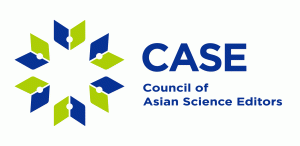Sun Huh, President KCSE

Sun Huh, President KCSE
[Introduction]
[Q]: Would you briefly explain your organization to the readers of CASE including the goals and vision?
[A]: Korean Council of Science Editors is the forum for science editors in Korea whose goals are to promote the quality of scientific journals published in Korea through information exchange and discussions on editing. Its vision is to raise the style and format of science journals in Korea to bring them to the international level.
[Questions]
[Q]: Congratulations on your inauguration as chairman. Would you tell us about your inauguration testimony?
[A]: Thank you. Since the inaugural general meeting was held in September 2011, KCSE has become a meeting for science editors and has provided various services for member editors. It has also played an excellent role as an exchange venue for the editors of 346 member journals. I will do my best to faithfully carry on the work that has been achieved for 9 years to maintain the reputation. Furthermore, KCSES will help the editor describe the adherence to the 3rd version of “Principles of Transparency and Best Practice in Scholarly Publishing” proposed by international organizations in all of our member academic journals. According to the Library Act, I will encourage editors to make a digital archiving of journal contents in the National Library of Korea. I wish editors and related experts of the member organizations be happy and enjoy editing and publishing, albeit difficult.
[Q]: As the KCSE celebrates its 10th anniversary this year, it seems that your determination would be extraordinary. Also, the KCSE was founded for the first time in Asia. What opportunities did you take for this?
[A]: After the inauguration of KCSE, the achievements of KCSE are brilliant ones: frequent informative workshops and seminars for editors, the launch of a scholarly journal for editors, settlement of the system of Korean Manuscript Editors Certification, and communication with Asian editors through the Council of Asian Science Editors. I will continue to maintain those systems continuously by frequent communication with editors. In 2019, COVID-19 influenced the editors’ life. We can not help but meet together through an online platform. I will make it another opportunity for editors to participate more conveniently without a barrier of the location. Furthermore, I will help other Asian countries’ editors organize their own editors’ meetings, like Vietnam and Indonesia. The online meeting will be another good platform for editors to meet together in each country more easily.
[Q]: You are very active in various activities as the chairman of the KCSE and the KAMJE. Can you briefly explain your contributions to each of both organizations?
[A]: I have devoted myself to KCSE for 9 years from the Council’s inauguration by supporting three past presidents. For KAMJE, I had worked as a board member from 1996 to 2011. I played a pivotal role in establishing KoreaMed, KoMCI, and KoreaMed Synapse. Furthermore, I made a system of editor’s academy with other medical editors.
[Q]: The KCSE publishes one of the few publication-related journals in the world, the Science editing. Who are the target readers, and what are the purposes of the publication?
[A]: Target readers are editors, manuscript editors, the staff of publishers (societies), authors, and reviewers of the scholarly journals, especially in Asia. Editors in Western countries do not have to study much on the publishing policy or budget because global commercial publishing companies publish most journals. However, most scholarly journals in Asia have been published by the non-profit organization, including academic societies and institutes. Therefore, it is hard for Asian editors to catch recent trends in scholarly journals. Science Editing aims to provide more detailed information on editorial policy and publishing policy for society journal editors. Due to a relatively short job period of Asian editors, continuous support is essential to them. This unique journal for editors will be a forum for them to promote their journals to top-tier ones.
[Q]: In the digital publishing era, how should we respond to the merger of global publishers and technological advances in the publication of small-scale academic journals published by academies and universities in Asia?
[A]: Merged global publisher’s influence has become more potent in the scholarly journal market. Small-scale academic journals have difficulties in competing with them. However, if there are excellent manuscript editors, administrative staff, information technology engineers, and English editors, those local journals can survive in the jungle. If editors are equipped with recent information and technology, and the financial support is enough, they will show their competency excellently. There were already top-level local journals from Asia listed in Journal Citation Report or SCIMAGO, for example, Journal of Stroke. Local journals should cooperate to establish an excellent local publisher to help them in all areas of editing and publishing. When such a supporting companies’ size and competence are promoted to the international level, editors will only concentrate on the review.
[Q]: Finally, are there any words you would like to say to the CASE?
[A]: We are all in a ship that makes a voyage in the COVID-19 pandemic sea. To reach the safe period, science and technology, and medical journals have done the best role by providing essential information to combat COVID-19. I hope all editors continue their calling mission to save the people from the present pandemic. Also, I wish editors stay safe and healthy.
Brief Biography;
Dr. Sun Huh graduated from Seoul National University College of Medicine in 1982. After his alumni university training with a Parasitology major, he moved to Hallym University in 1988 as a tenure-track lecturer and became a Professor in 1999. He has been an editor of the Journal of Educational Evaluation for Health Professions since 2005. His major concerns are journal editing and publishing, adoption of measurement theory in medical education, and parasite epidemiology.
